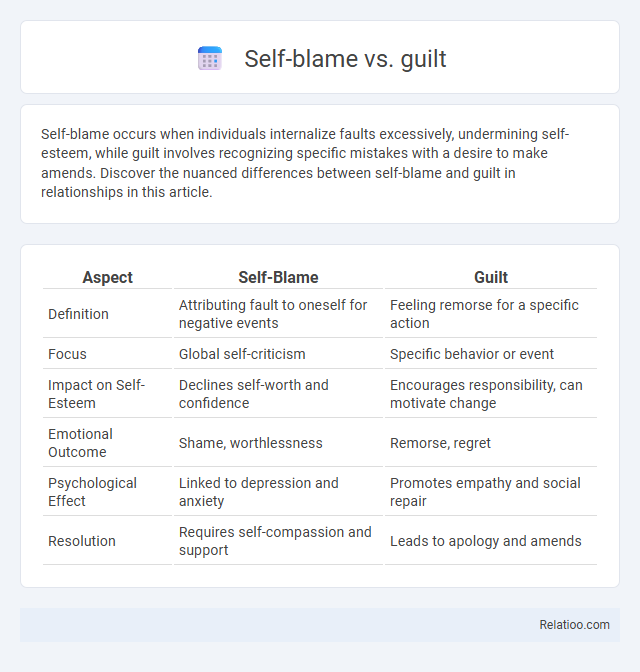Self-blame occurs when individuals internalize faults excessively, undermining self-esteem, while guilt involves recognizing specific mistakes with a desire to make amends. Discover the nuanced differences between self-blame and guilt in relationships in this article.
Table of Comparison
| Aspect | Self-Blame | Guilt |
|---|---|---|
| Definition | Attributing fault to oneself for negative events | Feeling remorse for a specific action |
| Focus | Global self-criticism | Specific behavior or event |
| Impact on Self-Esteem | Declines self-worth and confidence | Encourages responsibility, can motivate change |
| Emotional Outcome | Shame, worthlessness | Remorse, regret |
| Psychological Effect | Linked to depression and anxiety | Promotes empathy and social repair |
| Resolution | Requires self-compassion and support | Leads to apology and amends |
Understanding Self-Blame: Definition and Origins
Self-blame is the tendency to hold oneself responsible for negative outcomes, often rooted in cognitive distortions and past trauma. Unlike guilt, which is a specific emotion tied to a particular event, self-blame can be a pervasive pattern affecting self-esteem and mental health. Understanding self-blame involves examining its psychological origins, including learned behaviors and maladaptive coping mechanisms that reinforce negative self-assessments.
What Is Guilt? Key Differences from Self-Blame
Guilt is an emotional experience that arises when a person believes they have violated a moral standard, focusing on specific actions rather than the self, whereas self-blame involves attributing negative outcomes to one's character or identity. Unlike self-blame, which can lead to pervasive feelings of worthlessness and depression, guilt tends to motivate reparative behaviors and personal growth. Understanding this distinction is crucial for addressing maladaptive thought patterns and fostering emotional healing.
Psychological Roots of Self-Blame
Self-blame stems from maladaptive cognitive patterns where individuals internalize negative events as personal failures, often linked to low self-esteem and learned helplessness. Unlike guilt, which involves remorse for specific actions, self-blame generalizes to one's entire self-worth, sometimes exacerbating symptoms of depression and anxiety. Psychological roots include early attachment issues, trauma, and cognitive distortions such as personalization and overgeneralization, reinforcing a chronic sense of personal responsibility for adverse outcomes.
How Guilt Influences Emotions and Behaviors
Guilt acts as a powerful emotional signal that promotes reflection on one's actions and encourages reparative behaviors to mend relationships or improve personal conduct. Unlike self-blame, which often involves harsh self-criticism and can lead to decreased self-worth, guilt is typically tied to specific behaviors and motivates responsible decision-making. Understanding the nuances between guilt, self-blame, and shame is essential in psychological therapy to foster emotional growth and healthier coping mechanisms.
Self-Blame vs Guilt: Core Distinctions
Self-blame involves attributing personal responsibility for negative outcomes, often internalizing fault beyond realistic boundaries, while guilt specifically arises from recognizing a wrongdoing that violates personal or societal moral standards. Guilt tends to motivate corrective actions and reconciliation, promoting emotional growth and accountability, whereas self-blame frequently results in excessive self-criticism and emotional distress without constructive outcomes. Understanding these distinctions helps in therapeutic contexts by targeting maladaptive self-blame patterns and fostering healthy guilt processing to improve mental well-being.
Effects of Chronic Self-Blame on Mental Health
Chronic self-blame can significantly impair your mental health by fostering persistent feelings of worthlessness and increasing vulnerability to depression and anxiety disorders. Unlike guilt, which motivates corrective behaviors, self-blame often leads to rumination and negative self-perception that hinder emotional resilience and recovery. Therapies targeting cognitive restructuring and self-compassion are essential for mitigating these detrimental effects and promoting healthier coping mechanisms.
Positive and Negative Sides of Guilt
Guilt, distinct from self-blame, serves as a crucial emotional signal that alerts You to moral transgressions and motivates reparative actions, fostering personal growth and stronger relationships. Positive guilt encourages accountability and empathy, leading to constructive changes, while negative guilt, when excessive or irrational, can result in emotional distress, lowered self-esteem, and hindered decision-making. Understanding the balance between healthy guilt and detrimental self-blame enables emotional resilience and promotes mental well-being.
Overcoming Unhealthy Self-Blame
Overcoming unhealthy self-blame involves recognizing its destructive impact on mental health compared to guilt, which is a more adaptive emotional response to specific actions. Cognitive-behavioral therapy techniques, such as reframing negative thoughts and building self-compassion, are effective methods to reduce excessive self-blame. Distinguishing between guilt--which motivates positive change--and pervasive self-blame, which erodes self-esteem, is crucial for emotional recovery and resilience.
Transforming Guilt into Personal Growth
Transforming guilt into personal growth requires distinguishing it from self-blame, as guilt reflects awareness of a specific wrongdoing, while self-blame often involves internalizing fault excessively. By reframing guilt as a catalyst for learning and accountability, individuals can foster emotional resilience and behavioral change. Effective strategies include cognitive restructuring, mindfulness practices, and seeking therapeutic support to redirect guilt towards constructive self-improvement rather than persistent self-criticism.
Strategies for Balancing Accountability and Self-Compassion
Balancing accountability and self-compassion requires differentiating between self-blame and guilt, where guilt motivates positive change while self-blame fosters unnecessary harshness. Effective strategies include cultivating mindfulness to recognize feelings without judgment, practicing self-forgiveness to prevent destructive inner criticism, and reframing mistakes as learning opportunities. Incorporating therapeutic techniques such as cognitive-behavioral therapy (CBT) can help reshape negative thought patterns and foster a healthier relationship with oneself.

Infographic: Self-blame vs Guilt
 relatioo.com
relatioo.com